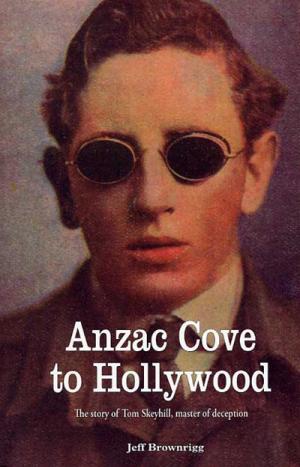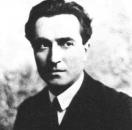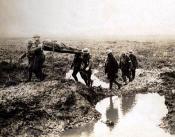In our little wet home in the trench
That the rain storms continually drench
There’s a dead cow near-by with its hooves in the sky
And it gives off a terrible stench.
Beneath us instead of a floor
Is a layer of cold mud and some straw.
The Jack Johnsons we dread
As they speed overhead
In our little wet home in the trench.
That the rain storms continually drench
There’s a dead cow near-by with its hooves in the sky
And it gives off a terrible stench.
Beneath us instead of a floor
Is a layer of cold mud and some straw.
The Jack Johnsons we dread
As they speed overhead
In our little wet home in the trench.
envoyé par Bernart Bartleby - 9/9/2014 - 15:34
Langue: anglais
Versione spesso attribuita a tal Tom Skeyhill, soldato australiano dell’ANZAC, che l’avrebbe composta a Gallipoli nel 1915.
Tom Skeyhill, reso cieco dai gas, si reinventò come poeta, scrisse “Soldier-Songs from Anzac”, una raccolta di grande successo e poi si trasferì negli USA, dove divenne celebre scrivendo quel diario del sergente Alvin C. York, eroe di guerra americano, sul quale il regista Howard Hawk basò la sceneggiatura del suo film “Sergeant York” (1941) interpretato da Gary Cooper.

Tom Skeyhill, reso cieco dai gas, si reinventò come poeta, scrisse “Soldier-Songs from Anzac”, una raccolta di grande successo e poi si trasferì negli USA, dove divenne celebre scrivendo quel diario del sergente Alvin C. York, eroe di guerra americano, sul quale il regista Howard Hawk basò la sceneggiatura del suo film “Sergeant York” (1941) interpretato da Gary Cooper.

MY LITTLE WET HOME IN THE TRENCH
I've a little wet home in the trench,
Which the rain-storms continually drench;
Blue sky overhead,
Mud and clay for a bed,
And a stone that we use for a bench.
Bully beef and hard biscuits we chew;
Shells crackle and scare,
But no place can compare
With my little wet home in the trench.
Our friends in the trench o'er the way
Seem to know that we've come here to stay;
They rush and they shout,
But they can't get us out,
Though there's no dirty work they don't play.
They rushed us a few nights ago,
But we don't like intruders, and so
Some departed quite sore,
Others sleep evermore,
Near my little wet home in the trench.
So hurrah for the mud and the clay,
It's the road to "Der Tag"—that's "The Day."
When we enter Berlin,
That big city of sin,
Where we'll make the fat Berliner pay,
We'll remember the cold, and the frost,
When we scour the fat land of the Bhost;
There'll be shed then, I fear
Redder stuff than a tear
For my little wet home in the trench.
I've a little wet home in the trench,
Which the rain-storms continually drench;
Blue sky overhead,
Mud and clay for a bed,
And a stone that we use for a bench.
Bully beef and hard biscuits we chew;
Shells crackle and scare,
But no place can compare
With my little wet home in the trench.
Our friends in the trench o'er the way
Seem to know that we've come here to stay;
They rush and they shout,
But they can't get us out,
Though there's no dirty work they don't play.
They rushed us a few nights ago,
But we don't like intruders, and so
Some departed quite sore,
Others sleep evermore,
Near my little wet home in the trench.
So hurrah for the mud and the clay,
It's the road to "Der Tag"—that's "The Day."
When we enter Berlin,
That big city of sin,
Where we'll make the fat Berliner pay,
We'll remember the cold, and the frost,
When we scour the fat land of the Bhost;
There'll be shed then, I fear
Redder stuff than a tear
For my little wet home in the trench.
envoyé par Bernart Bartleby - 9/9/2014 - 15:36
×
![]()





Ho preferito attribuire il testo ad anonimo perché le versioni di questa canzone sono moltissime. Su alcuni siti poi questa strofa in particolare è attribuita a tal George Shipstone del 10° King's Royal Hussars (KRH), su altri a tal John Lucy.
Parodia di “Little Grey Home in the West”, canzone composta nel 1911 da D. Eardley-Wilmot (parole) ed Hermann Lohr (musica), celebre nell’interpretazione del baritono australiano Peter Dawson.
Alcuni protagonisti della Grande Guerra: Soldati, fango e croci
“Jack Johnsons” – al pari di Whizbangs, Minnies, Rum Jars, Coal Boxes e altre - è un’espressione usata nella Grande Guerra ad indicare i colpi di artiglieria, e probabilmente fa riferimento ai terribili colpi che infliggeva agli avversari John Arthur "Jack" Johnson (1878 –1946), detto The Galveston Giant, il primo pugile afroamericano campione del mondo dei pesi massimi…